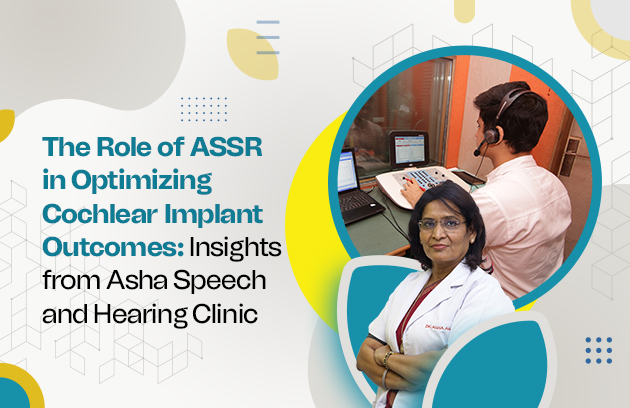Cochlear implants have been a game-changer for individuals with profound hearing loss, offering them a lifeline to the world of sound and communication. The journey to successful cochlear implantation involves a multitude of assessments and procedures, each contributing to the overall effectiveness of the implant. One such assessment tool that has proven invaluable in optimizing cochlear implant outcomes is Auditory Steady-State Response (ASSR). In this blog post, we’ll delve into the significant role that ASSR plays, drawing insights from experts at the Asha Speech and Hearing Clinic.
Understanding Auditory Steady-State Response (ASSR):
Auditory Steady-State Response is a neurophysiological measurement used to assess the hearing thresholds of individuals, particularly those who may not be able to provide reliable behavioral responses, such as young children or individuals with developmental disabilities. ASSR involves the presentation of auditory stimuli, typically modulated tones or frequency-specific signals, while recording the brain’s electrical activity in response to these stimuli.
Optimizing Cochlear Implant Outcomes with ASSR:
The Asha Speech and Hearing Clinic, known for its pioneering work in the field of auditory rehabilitation, recognizes the pivotal role of ASSR in optimizing cochlear implant outcomes. Here’s how ASSR contributes to the success of cochlear implantation:
1. Accurate Hearing Threshold Measurement: Precise hearing threshold determination is crucial for cochlear implant programming. ASSR offers a reliable and objective method for assessing the hearing thresholds across a range of frequencies, allowing clinicians to customize implant settings that cater to the individual’s specific hearing needs.
2. Cochlear Implantation: In cases where infants and young children are cochlear implant candidates, obtaining behavioral responses for threshold assessment can be challenging. ASSR bypasses this limitation, enabling accurate hearing evaluations for even the youngest patients. This ensures that children receive appropriate cochlear implant settings from the outset, crucial for their auditory development.
3. Bilateral Implantation Strategies: Many individuals receive bilateral cochlear implants for improved sound localization and overall hearing experience. ASSR aids in determining the optimal balance of stimulation between the two implants, ensuring a harmonious auditory perception between the ears.
4. Fine-Tuning Implant Settings: After the initial implant activation, ongoing adjustments are often necessary to fine-tune the device for maximum benefit. ASSR assists in monitoring changes in hearing thresholds over time, facilitating adjustments that reflect improvements in auditory perception and sensitivity.
Advantages of ASSR in Cochlear Implantation:
• Objective Measurements: ASSR provides objective measurements of hearing thresholds, reducing potential subjectivity in interpreting behavioral responses.
• Non-Invasive: The procedure is non-invasive and comfortable for patients, making it suitable for all age groups.
• Comprehensive Evaluation: ASSR evaluates a wide range of frequencies, offering a comprehensive overview of a patient’s auditory sensitivity.
• Individualized Care: The data obtained through ASSR aids in tailoring cochlear implant programming to meet the unique needs of each recipient.
The Asha Speech and Hearing Clinic’s integration of ASSR into their cochlear implant evaluation and programming processes underscores its significance in achieving optimal hearing outcomes. By leveraging this advanced assessment technique, they exemplify a commitment to staying at the forefront of auditory rehabilitation, ultimately enriching the lives of individuals with hearing loss.
Conclusion
Auditory Steady-State Response is a valuable tool that enhances the success of cochlear implantation. Its ability to accurately assess hearing thresholds, especially in challenging populations, and guide individualized programming contributes significantly to the overall effectiveness of cochlear implants. As clinics like Asha Speech and Hearing Clinic continue to embrace and refine the use of ASSR, the future of cochlear implantation holds even more promise for those seeking to regain the gift of sound.

